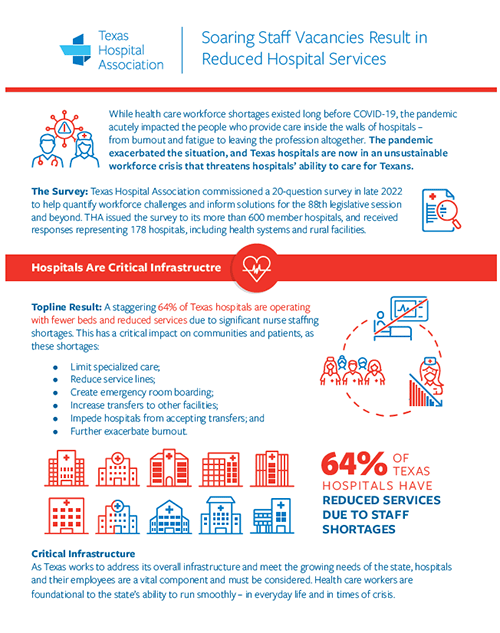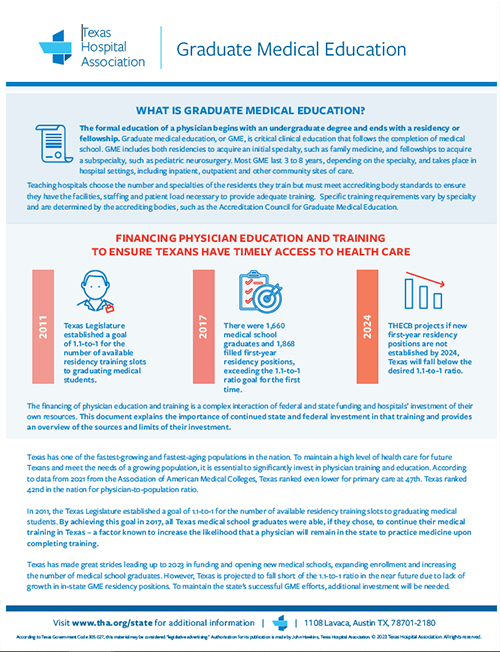With a population growing more than twice as fast as the national average – and people living longer and experiencing more chronic illness – the demand for health care has never been greater. Unfortunately, Texas has too few physicians to meet the health care needs of its growing population.
The state has well-document shortages of primary care physicians and other specialists, including psychiatrists. More than 80 percent of Texas counties are designated as mental health professional shortage areas, and about 40 percent of Texas counties’ primary care health needs are not currently being met. Shortages of nurses and allied health professionals contribute to this problem.
The Texas Legislature has invested significant funds to increase the size of the health care workforce in Texas, but continued investment is required to combat the severe shortage of physicians, nurses and other health care professionals.
Growing the health care workforce, including the number of behavioral health professionals, in Texas is a top priority for the Texas Hospital Association.

Workplace Violence Prevention Toolkit
The Texas Legislature addressed workplace violence in hospitals during its 2023 session with two crucial new laws aimed at protecting health care workers. This workplace violence prevention toolkit from THA and the Texas Nurses Association outlines the particulars of the new laws and also contains information on other state and federal laws related to workplace violence.

Soaring Staff Vacancies Result in Reduced Hospital Services
While health care workforce shortages existed long before COVID-19, the pandemic acutely impacted the people who provide care inside the walls of hospitals – from burnout and fatigue to leaving the profession altogether. The pandemic exacerbated the situation, and Texas hospitals are now in an unsustainable workforce crisis that threatens hospitals’ ability to care for Texans.

Graduate Medical Education
The formal education of a physician begins with an undergraduate degree and ends with a residency or fellowship. Graduate medical education, or GME, is critical clinical education that follows the completion of medical school. This document explains the importance of continued state and federal investment in that training and provides an overview of the sources and limits of their investment.
Additional Resources
- Soaring Staff Vacancies Result in Reduced Hospital Services (2/7/23)
- THA Comment Letter on FORWARD Loans (11/4/22)
- THA Submits Testimony on Workforce Challenges (5/10/22)
- THA Written Testimony on Workforce Shortages (5/5/22)
- Workforce Shortages Threaten Patient Care (3/17/22) | THA
- A Workforce in Peril: Shortages Threaten Patient Care (3/7/22) | THA
- Despite Workforce Challenges Frontline Workers Bravely Tackle Another Surge (1/18/22) | THA
Related Articles
Remaining Resilient in Health Care
We’ve all heard it: the perfunctory instructions given by flight attendants before a plane’s departure. Amid demonstrations of the aircraft’s safety features and what to do if there is a…
Reeling in Rural Texas
Three times during the COVID-19 pandemic, Dimmit Regional Hospital came close to taking out a loan just to make payroll. One of those times, the Carrizo Springs facility – tucked…
The Numbers Are In: Our Hospital Workforce Needs Serious Help
Three years after the beginning of the pandemic, hospitals have started to put the pieces back together and take inventory of COVID-19’s wide-ranging, long-lasting impact on health care. That process…
The Texas Legislature Convenes: THA’s Priorities for a Great 88
Every two years, Texas hospitals get less than five months to convince state lawmakers how to foster a better health care landscape in the Lone Star State. That window opens…




